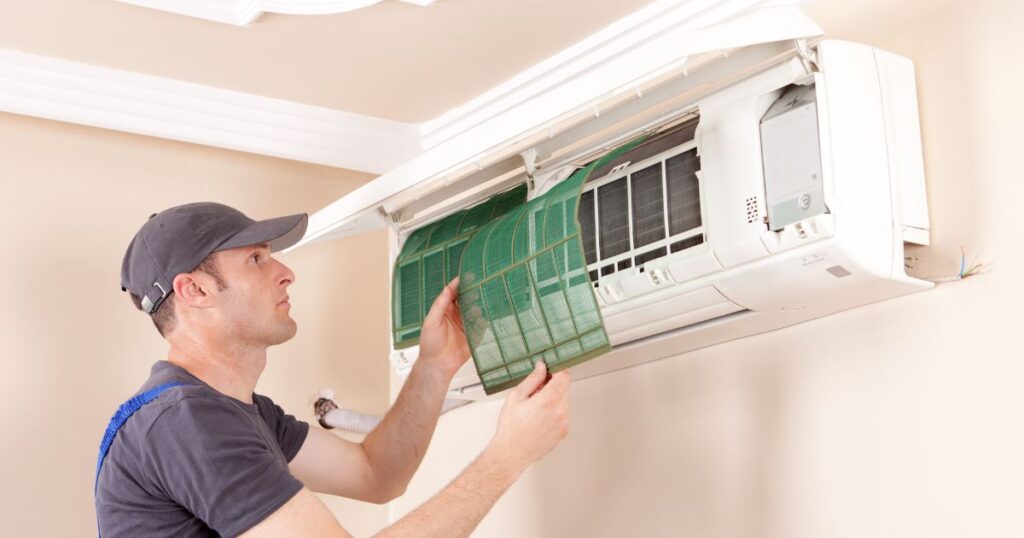
Heating, ventilation, and air conditioning (HVAC) systems are essential components of any building or residence. As such, HVAC technicians are in high demand, making it a lucrative field for those looking to start a career in the trades. Dallas is home to numerous HVAC training facilities that offer comprehensive programs designed to equip aspiring technicians with the skills and knowledge they need to succeed.
The Importance of HVAC Training in the Industry
While some may assume that education in HVAC is unnecessary due to the hands-on nature of the work, this couldn’t be further from the truth. Proper training is critical for success in this field. HVAC systems have become increasingly complex over the years, requiring specialized knowledge and skill sets to maintain and repair effectively.
Technicians must also stay up-to-date with industry advancements and regulations. Without proper education and training on these topics, workers risk making costly mistakes or being left behind by competitors who invest in their education.
Moreover, as more emphasis is placed on energy efficiency and sustainability in building design, employers are seeking out technicians with specialized training in these areas. Those who complete comprehensive programs will have a significant advantage when searching for employment opportunities after graduation.
In short, Dallas HVAC training is essential for anyone looking to excel as an HVAC technician. With rigorous curriculums designed by industry experts and access to state-of-the-art facilities equipped with cutting-edge technology, students will be well-prepared for whatever challenges come their way during their careers.
What is HVAC?
Are you familiar with the term HVAC? It stands for Heating, Ventilation, and Air Conditioning.
This system is crucial in both residential and commercial buildings because it regulates the temperature, humidity, and air quality of the indoor environment. The system works together to maintain a comfortable climate throughout the entire building.
Explanation of HVAC System
The HVAC system is designed to keep a building’s occupants comfortable all year round. It consists of three main components: heating, ventilation, and air conditioning.
- Heating systems provide warmth during colder months, while air conditioning systems cool down spaces during warmer months.
- Ventilation is also essential in an HVAC system as it ensures that fresh air circulates within the building while removing stale or polluted air. Without proper ventilation, indoor air quality can suffer or even become hazardous.
- To ensure that heating, ventilation, and cooling systems work seamlessly together; they are controlled by a thermostat or other control unit placed centrally within a building. These controls allow you to set temperature preferences according to your needs.
Types of HVAC Systems
There are four primary types of HVAC systems available today. These include:
- Split Systems – The most common type of residential system that has both an indoor and outdoor unit for heating and cooling
- Hybrid Heat Split System – This split system uses both an electric heat pump and a gas furnace for cost-efficient heating
- Duct-Free (Mini-Split) System – Ideal for homes without ductwork since they don’t require ducts to distribute conditioned air
- Packaged Heating & Air – All-in-one solutions where all components are housed in one single outdoor unit. While there are different types of HVAC systems available depending on your needs and preferences, it’s essential to choose one that suits your specific requirements best.
Why Choose Dallas for HVAC Training?
Overview of Dallas as a Hub for the HVAC Industry
Dallas is known as one of the busiest cities in the United States due to its booming economy and rapidly growing industries. One such industry that has seen steady growth in recent years is HVAC.
According to US News & World Report, Texas ranks among one of the top states with the highest employment level in this field, and Dallas stands out as a hub for HVAC training with numerous technical schools and community colleges that offer courses. Dallas’ proximity to major highways makes it an ideal location for transportation of goods and services.
This includes HVAC systems, which are often transported from manufacturers to customers across state lines. With many prominent companies based in Dallas including Lennox International, Trane Technologies, and Johnson Controls International, there are many opportunities for students who train here to find job openings within reputable organizations.
Availability of Top-notch Training Facilities and Programs
In addition to being home to several top-ranked universities such as Southern Methodist University (SMU) and the University of Texas at Dallas (UTD), there are also several technical schools devoted solely to trade skills like welding or electrical work.
Many offer various programs on HVAC that provide hands-on training alongside classroom sessions. One such facility is the RSES Training Center located just outside of downtown Dallas which provides education on all aspects of refrigeration systems, including air conditioning systems.
The center offers a comprehensive education program that can lead students toward certification from industry leaders like North American Technician Excellence (NATE). Other notable facilities include Lincoln Tech Institute, ATI Career Training Center, Fortis Institute, and others.
Additionally, some programs come bundled with apprenticeships or internships which give students valuable experience working alongside seasoned professionals even before they graduate. These opportunities help build confidence while giving them first-hand knowledge specific to their area of study in order to prepare them for success in the workplace.
RELATED: Chilling Like a Boss: Mastering HVAC Systems in Dallas, Texas
More About Dallas HVAC Training
Curriculum: Overview of Courses Offered
Dallas HVAC Training offers a comprehensive program that covers everything from basic electrical systems and refrigeration principles to advanced air conditioning techniques. The curriculum is designed to give students a solid foundation in the field of HVAC so that they are prepared for any challenges they may face in their future careers. The courses offered include topics such as refrigeration principles, electrical systems, heating systems, air conditioning, and ventilation.
These courses cover both theory and practical applications, giving students the knowledge and skills they need to succeed in the industry. Additionally, Dallas HVAC Training offers specialized training in areas such as commercial refrigeration and high-efficiency HVAC systems.
In-Depth Discussion on Core Subjects
One of the most important parts of Dallas HVAC Training is the depth of coverage given to core subjects such as electrical systems, refrigeration, and air conditioning. Students learn about wiring diagrams, voltage testing procedures, and circuit breakers/fuses replacement procedures, among other topics about electrical systems. They also learn how to identify different types of refrigerants used in various cooling applications.
In addition to covering the basics of these subjects, instructors dive deeper into more advanced topics like system analysis and troubleshooting techniques. Graduates with this level of understanding have an advantage in the job market because employers seek qualified technicians skilled at identifying problems early on.
Hands-On Experience: Description of Hands-On Training Opportunities
One unique feature that sets Dallas HVAC Training apart from other programs is its emphasis on giving students hands-on experience with real-world equipment. The school has a fully equipped lab where students can practice using tools like multimeters or soldering irons among others, under supervision before using them on expensive equipment found at job sites.
By allowing students to work with equipment similar to what they will encounter in the field, Dallas HVAC Training gives them a leg up on the competition when it comes time to find employment. Not only do students acquire a current working knowledge of state-of-the-art technology, but they also learn how to work safely and efficiently.
Importance of Practical Experience in the Field
In addition to hands-on training opportunities, Dallas HVAC Training also offers internships and apprenticeships that give students practical experience in real-world situations. This is critical because it enables them to work alongside experienced technicians while gaining valuable skills that can’t be taught in a classroom.
Through internships and apprenticeships, students learn how to interact with customers; these experiences often help them develop networks they can use later on when looking for full-time positions. Practical experience is essential for graduates’ success because many employers value hands-on experience over theoretical knowledge.
Certification and Licensure
To work as an HVAC technician in Dallas or any other part of Texas requires certification and licensure. Instructors at Dallas HVAC Training provide information about these requirements so that students can prepare themselves before graduating.
Certification is available through organizations such as the North American Technician Excellence (NATE), while licensing is regulated by state agencies like the Texas Department of Licensing & Regulation (TDLR). Licensure requires passing an exam demonstrating technical competence after acquiring practical experience; requirements vary based on jurisdiction-specific regulations.
Certification shows potential employers that graduates have the necessary skills backed by an independent third party. Dallas HVAC Training provides guidance on obtaining both certification and licensure so that graduates are fully prepared upon entering the job market.
Career Opportunities: Starting Your Career on the Right Foot
So, you’ve completed your HVAC training in Dallas. Now what?
The good news is that career opportunities in this field are abundant. With a growing demand for HVAC technicians throughout the Dallas area, you can expect to find plenty of job openings once you’ve completed your training.
Entry-level positions for HVAC technicians typically involve installing, maintaining, and repairing heating and cooling systems in residential or commercial settings. These positions can lead to higher-level roles such as system designers or project managers with more experience under your belt.
In terms of salary, entry-level technicians can expect to earn between $35,000 and $45,000 per year, depending on their location and experience level. Rest assured, though – there’s plenty of room for growth in this field.
Industry Connections: Building Your Network
One of the many benefits of attending an HVAC training program in Dallas is the opportunity to connect with industry professionals and potential employers. Many programs offer networking events where students can meet employers face-to-face and learn more about the industry from those already working within it. Additionally, some programs even offer job placement services once students have completed their training.
These services can include resume advice and interview coaching to help students put their best foot forward during the hiring process. By building relationships with industry professionals during your time at an HVAC training program in Dallas, you’ll be better equipped to land a job after graduation and start building a successful career in this exciting field.
Beyond the Basics: Continuing Education Opportunities
Just because you’ve completed your initial HVAC training doesn’t mean you’re done learning! The world of heating and cooling systems is constantly evolving as new technologies emerge. In order to stay ahead of the curve and continue advancing in your career as an HVAC technician, it’s important to seek out continuing education opportunities.
Many trade schools and community colleges offer HVAC courses that cover advanced topics such as energy efficiency or sustainable design. These courses can help you stay up-to-date on the latest trends and technologies in the HVAC industry, giving you a competitive edge when it comes to job opportunities.
Additionally, attending conferences or seminars can also be a great way to learn more about new products and trends in the field while also networking with other industry professionals. By continually seeking out educational opportunities throughout your career, you’ll be better positioned for success in this exciting field of work.
Frequently Asked Questions
How much does HVAC training cost in Texas?
The cost of HVAC training in Texas can vary widely depending on the program and school, but as of my knowledge, cutoff in September 2021, you might expect to pay between $1,200 to $15,000; the cost often includes textbooks, lab fees, and other educational expenses.
How long is HVAC school in Texas?
HVAC training programs in Texas typically last between 6 months to 2 years, depending on whether you’re pursuing a certificate, diploma, or associate degree; apprenticeships, which provide on-the-job training, can last up to 5 years.
How do I become a licensed HVAC technician in Texas?
To become a licensed HVAC technician in Texas, you must first complete an approved training program or apprenticeship, then pass a state licensing exam administered by the Texas Department of Licensing and Regulation (TDLR); the license also requires a certain amount of work experience, typically 2 years.
How much does an HVAC tech make in Texas?
The average salary for an HVAC technician in Texas is roughly between $45,000 and $50,000 per year, but this can fluctuate based on factors such as experience, certifications, and the specific company.
Is HVAC in demand in Texas?
HVAC services are generally in high demand in Texas due to the state’s climate, which requires both heating and cooling systems for comfortable living; the growth of cities and the construction industry also contribute to this demand.
Does Texas require an HVAC license?
Texas does require HVAC technicians to be licensed; the Texas Department of Licensing and Regulation (TDLR) oversees the licensing process, which includes passing an examination and meeting certain experience requirements.
RELATED: Navigating HVAC Careers: Exploring Jobs in Dallas Fort Worth, TX
Conclusion
After delving into the world of Dallas HVAC training, it becomes clear that this is an important and lucrative field to consider. The demand for skilled HVAC technicians is growing rapidly as the need for heating and cooling systems in commercial and residential buildings increases.
- By obtaining certification and licensure through a reputable HVAC training program, individuals can take advantage of the opportunities that are available in Dallas and beyond. One of the major benefits of Dallas HVAC training is the comprehensive curriculum that covers all aspects of heating, ventilation, and air conditioning systems.
- From electrical systems to refrigeration, students gain a well-rounded education on both theory and practical skills needed to succeed in this field. This thorough understanding makes graduates attractive candidates for employment opportunities in various industries, including healthcare, hospitality, manufacturing, education, and government facilities management.
- Another valuable aspect of Dallas HVAC training is the hands-on experience provided by many programs. The opportunity to work with equipment in a real-world setting allows students to develop critical thinking skills while gaining confidence in their abilities.
- Practical experience also helps prepare graduates for working with clients or customers who may have unique heating or cooling needs. One cannot overlook the networking opportunities provided by reputable Dallas HVAC training programs.
- Students have access to professionals who can provide valuable insight into job prospects and career paths within the industry. Through relationships built during their time in school or at industry events like conventions or job fairs, graduates may find themselves being referred by professors or colleagues as they begin their careers.
It’s clear that choosing a career as an HVAC technician can be a smart move for those seeking stability and growth potential within an industry poised for continued expansion. By completing comprehensive coursework at one of many reputable schools located throughout the Dallas area, you will gain not only knowledge but also hands-on training with real-world equipment, which prepares them well once they graduate from their first job!






